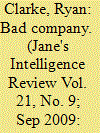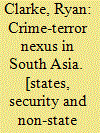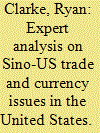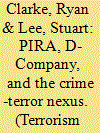|
|
|
Sort Order |
|
|
|
Items / Page
|
|
|
|
|
|
|
| Srl | Item |
| 1 |
ID:
090175


|
|
|
|
|
| Publication |
2009.
|
| Summary/Abstract |
While the militant threat continues to preoccupy security forces in India and Pakistan, organised crime remains an ongoing threat to state stability, particularly D Company, the major regional criminal organisation.
|
|
|
|
|
|
|
|
|
|
|
|
|
|
|
|
| 2 |
ID:
107802


|
|
|
|
|
| Publication |
2011.
|
| Summary/Abstract |
This article analyzes the previous and current dynamics of the arms trafficking network of the former Liberation Tigers of Tamil Eelam (LTTE) in Asia and its relevance for the post-conflict situation in Sri Lanka. It also analyzes some of the leading western theories on civil war and determines their relevance in this specific theater. Further analysis is provided regarding the state of the Tamil diaspora as well as the remainder of the LTTE's financial network. This article argues that the governments in Asia that house key sources of weaponry and other supplies for violent nonstate actors do not seem either willing or able to take any kind of meaningful action against these illicit markets aside from making occasional high-profile arrests. Further, key former LTTE financiers continue to reside in several western countries and many remain willing to underwrite arms smuggling operations in Asia, provided that there are effective managers. Given these realities combined with a nascent government-in-exile that continues to espouse the LTTE's raison d'être, the insurgency in Sri Lanka could reignite quicker and more intensely than most think if current political and demographic trends are not reversed and force levels of the Sri Lankan military cannot be sustained. However, any new Tamil militant groups would likely look quite different from their LTTE predecessors.
|
|
|
|
|
|
|
|
|
|
|
|
|
|
|
|
| 3 |
ID:
107762


|
|
|
|
|
| Publication |
London, Routledge, 2011.
|
| Description |
224p.
|
| Standard Number |
9780415610315, hbk
|
|
|
|
|
|
|
|
|
|
|
|
Copies: C:1/I:0,R:0,Q:0
Circulation
| Accession# | Call# | Current Location | Status | Policy | Location |
| 056248 | 363.3250954/CLA 056248 | Main | On Shelf | General | |
|
|
|
|
| 4 |
ID:
103496


|
|
|
|
|
| Publication |
2011.
|
| Summary/Abstract |
This article provides an in-depth analysis of the dynamics of American expert opinion on Sino-US trade and currency issues, and assesses the impact that these views have on the behaviour of American politicians. Views of leading American economists from industry, universities, think tanks, as well the media are closely analysed against the backdrop of an increasingly complicated and multifaceted discussion in the political realm. This study concludes that the American economic community is itself divided on these critical issues with no particular school of thought gaining ascendency over another, thus providing space for non-expert views and biases. This gap can be exploited for short-term gain with minimal risk to the credibility of American politicians and it should not be entirely surprising that this is happening with increasing frequency.
|
|
|
|
|
|
|
|
|
|
|
|
|
|
|
|
| 5 |
ID:
097178


|
|
|
|
|
| Publication |
2010.
|
| Summary/Abstract |
This article provides a discussion of the foundation of Lashkar-i-Taiba (LeT), the development of its modus operandi, and engages in an investigation of LeT's activities in India and Pakistan, including the Kashmir region. Further, LeT's fundraising methods are touched upon and LeT's relationships with regional state and non-state actors such as Pakistan's Inter-Services Intelligence (ISI) and Dawood Ibrahim's D-Company are analysed. This article argues that although LeT has been a vital component of Islamabad's regional strategy in the past, the organisation has grown beyond the control of its former patron and is largely self-sufficient and is able to operate independently of the political process. These developments challenge the long-held notion that irregulars can be sustainably used to achieve limited objectives in an asymmetric conflict and should serve as a clear warning to other state sponsors of terrorism. However, contrary to many analyses, LeT is not likely to sacrifice its independence and come under Al-Qaeda's umbrella. Rather, LeT will continue to evolve into a distinctive terrorist actor in its own right while still receiving aid from fringe elements in Pakistan's security and intelligence apparatus and elsewhere.
|
|
|
|
|
|
|
|
|
|
|
|
|
|
|
|
| 6 |
ID:
081827


|
|
|
| 7 |
ID:
082924


|
|
|
|
|
| Publication |
2008.
|
| Summary/Abstract |
This article compares and contrasts the Provisional Irish Republican Army (PIRA) and D-Company, two seemingly dissimilar organisations that nonetheless share some striking commonalities, especially in regards to the use of tactics that contradict their declared ideology in pursuit of a larger goal. First, the growing relationship between organised criminal syndicates and terror groups is discussed and Makarenko's well-known "Crime-Terror Continuum" introduced. Following this, a historical overview and an analysis of the organisational structure of the PIRA is provided and organisational models proposed. Further, the founding and development of D-Company is addressed in addition to the syndicate's intricate involvement in the 1993 Bombay Blasts. Similarly, organisational models are offered and conclusions drawn. This work then moves to a comparative analysis of the organisational and operating structure of the PIRA and D-Company and finishes with a brief conclusion. This article argues that although criminal syndicates and militant groups may have different organisation structures, the line that distinguishes their activities has begun to blur and the space between Makarenko's graduated levels is becoming smaller and less discernible, thus rendering her model obsolete.
|
|
|
|
|
|
|
|
|
|
|
|
|
|
|
|
| 8 |
ID:
104746


|
|
|
|
|
| Publication |
2011.
|
| Summary/Abstract |
China's calculated silence over the sinking of the ROKS Cheonan in March 2010 caused international uneasiness as North Korea appeared to get away with its latest military provocation. However, it is China's other vassal, Myanmar, that has pushed Beijing's restraint to the limit. Revelations of secret underground bunkers and covert Scud missile development have raised questions about whether China's clientism has backfired.
|
|
|
|
|
|
|
|
|
|
|
|
|
|
|
|
|
|
|
|
|